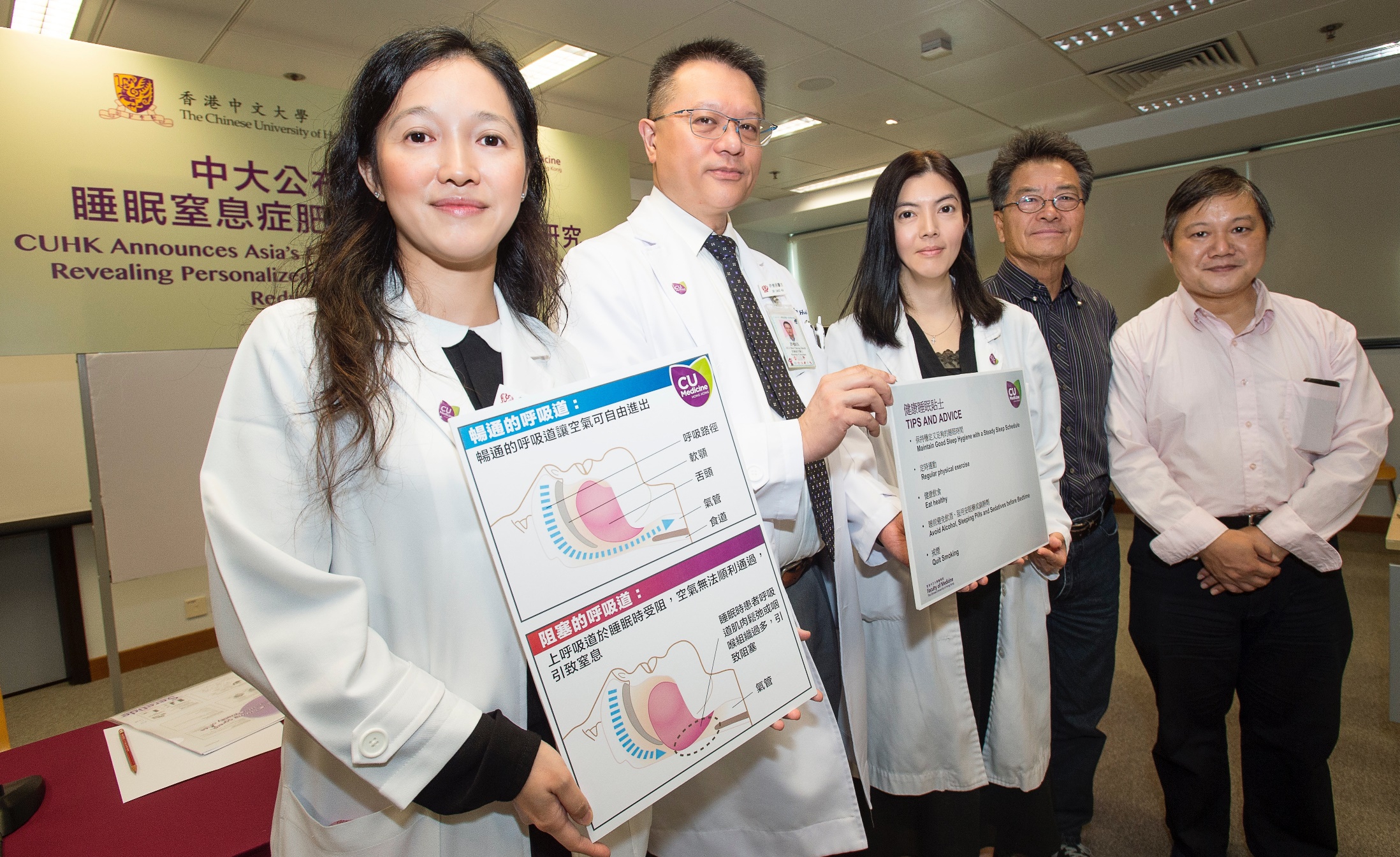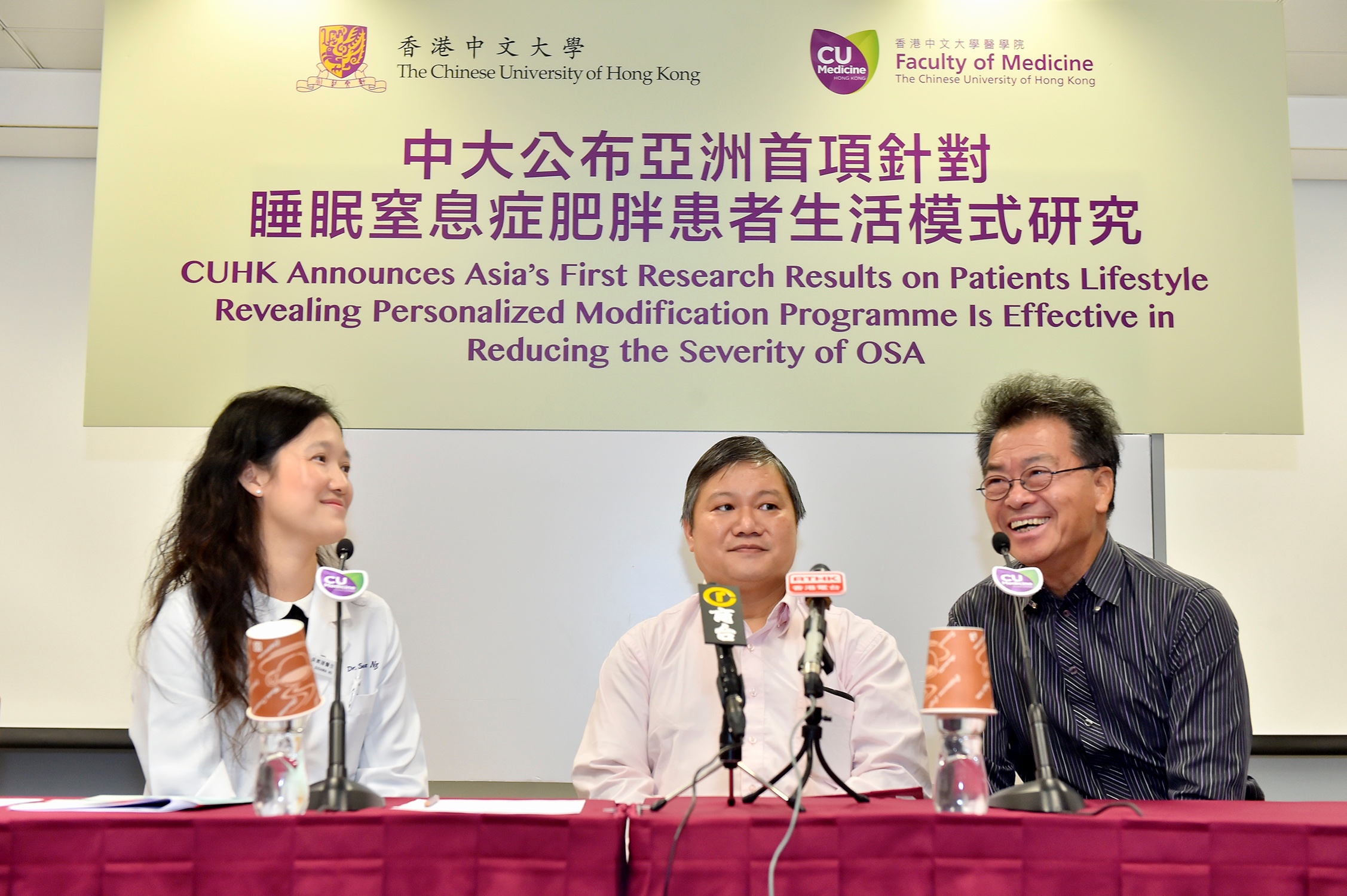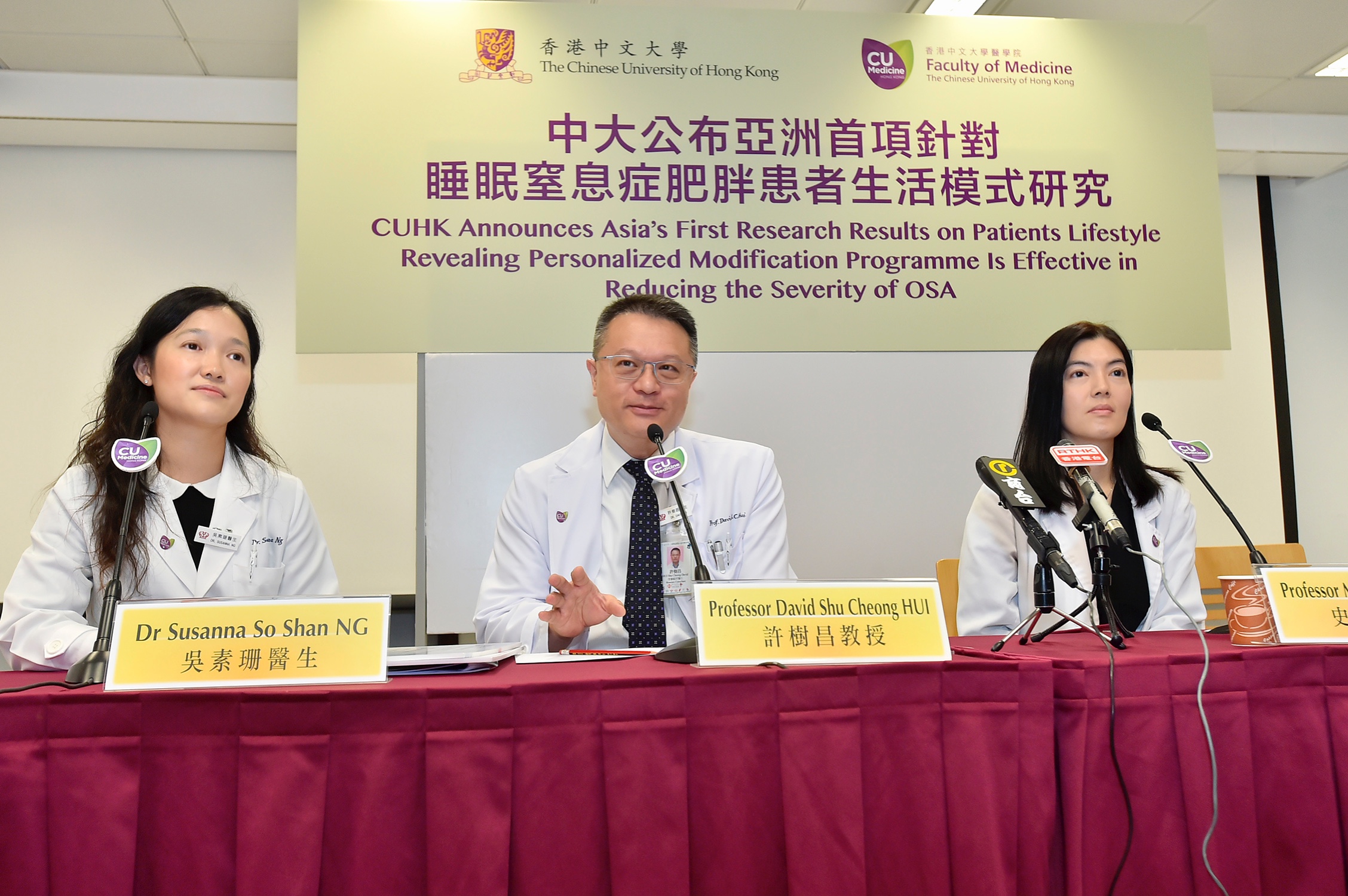CUHK
News Centre
Asia’s First Research by CUHK on Patients’ Lifestyle Reveals Personalised Modification Programme Effective in Reducing Severity of OSA
Research by The Chinese University of Hong Kong (CUHK) between 2011 and 2013 has proved that a personalised lifestyle modification programme with a dietary approach is effective in reducing the severity of Obstructive Sleep Apnea (OSA). The findings have been published in the latest issue of the leading international journal CHEST.
Consequences of untreated OSA include sudden death
OSA is a common form of sleep-disordered breathing characterized by recurrent episodes of upper airway obstruction. The prevalence rate of OSA among male adults in western countries and in Hong Kong is at least 4%.
During sleep, the muscle tone of the upper airway relaxes and may partially block the airway and vibrate, leading to snoring. When the airway is obstructed completely, there will be a cessation of airflow which reduces oxygen in the blood. It causes sleep fragmentation, disabling daytime sleepiness and impaired cognitive function. Serious consequences of untreated OSA include hypertension, heart failure, stroke and even sudden death due to accelerated atherosclerosis.
Prof. David S.C. Hui, Stanley Ho Professor of Respiratory Medicine, Department of Medicine and Therapeutics at CUHK, stated, ‘Besides having a small chin, smoking, using alcohol and hypnotics, and being male, obesity is also an important risk factor of OSA.’ The prevalence of OSA tends to increase with obesity, as observed in western countries.
Typical Treatment of OSA
The Apnea-hypopnea index (AHI) is used to reflect the severity of OSA. It is a count of the number of upper airway obstructions per hour of sleep, with 5 to 15 events being mild and 15 to 30 moderate. More than 30 events is severe disease.
Continuous positive airway pressure (CPAP) is considered as the first-line treatment for OSA. It can improve sleep quality, cognitive function and blood pressure. However, it has to be used every night on a regular basis and it is not curative. The compliance with CPAP is low. Moreover, body weight may increase due to marked reduction in energy expenditure during sleep with CPAP treatment.
Weight reduction has been advocated for OSA patients who are overweight in order to reduce the amount of fatty tissue at the airway which may reduce the OSA severity. A previous study showed that each percentage change in weight (in either direction) was associated with an approximate mean 3% change in AHI. Therefore, in addition to CPAP treatment, lifestyle modification leading to weight reduction is important for OSA patients who are overweight or obese.
Lifestyle Modification Programme
The existing studies of weight loss focus on very low calorie diets or surgically induced weight loss programmes only. None of them have applied a lifestyle modification programme (LMP) which emphasizes long term lifestyle and behavior change in Asians. Prof. Mandy M.M. Sea, Centre Manager, Centre for Nutritional Studies at CUHK explained, ‘LMP is a healthy weight loss programme established by CUHK and its efficacy has been clinically proven. It aims to help people lose weight and stay at a healthy weight as well as enhance their knowledge of nutrition through individualized tailor-made lifestyle counselling.’
Research Method and Results
The Division of Respiratory Medicine and the Centre for Nutritional Studies at CUHK have conducted a randomized controlled trial. From 104 obese patients with moderate to severe OSA, 61 were chosen at random to receive dietician-led LMP while the other 43 were put in the control group and received usual care such as simple lifestyle advice.
Patients in the LMP group had to attend a dietary consultation weekly in the first 4 months and then monthly in the following months. A customized weight management plan was made according to an individual patient’s lifestyle with an emphasis on fruit, vegetables, low-fat and low caloric products, and regular exercise. A caloric reduction of 10% to 20% in daily energy intake from the patient’s usual diet was set as the initial goal with subsequent adjustment based on the change in body weight. At 12 months, LMP was more effective in reducing the severity of OSA and the results of the two groups are tabulated as below:
| Lifestyle Modification Group | Usual Care Group | |
| Average Change of Body Mass Index (BMI) | -5.8% | -2.2% |
| Average Change of AHI | -16.9% | +0.6% |
13 subjects (21.3%) in the LMP group have the disease improved from severe OSA to moderate or mild and of these, 6.6% have the disease improved from severe to mild. Eating behaviour was improved as well by increased intake of fibre and reduced intake of fat.
Dr. Susanna S.S. NG, Clinical Assistant Professor (honorary), Department of Medicine and Therapeutics at CUHK, said, ‘Daytime sleepiness among those who complied with LMP has improved. These changes were observed 4 months after the initial intensive diet counselling and persisted for 12 months.’
Dr. NG concluded that LMP at CUHK is effective in reducing the severity of OSA. She also recommended the public to maintain good sleep hygiene with a steady sleep schedule and by quitting smoking and avoiding alcohol, sleeping pills and sedatives before bedtime. Obese patients with OSA who would like to learn more about LMP may contact the Centre for Nutritional Studies at 2252-8831 or 3178-9211.
(From left) Dr. Ng So-shan Susanna, Clinical Assistant Professor (honorary) and Prof. Hui Shu-cheong David, Stanley Ho Professor of Respiratory Medicine, both from the Department of Medicine and Therapeutics and Prof. Sea Man-mei Mandy, Centre Manager, Centre for Nutritional Studies, CUHK present the findings of Asia’s first research on the effect of Lifestyle Modification Programme on Obstructive Sleep Apnea patients.
OSA patient Mr Kwok (right) says his daytime sleepiness improved after joining the Lifestyle Modification Programme for 12 months; Mr Cheng (middle) also has his BMI improved from 35.6 to 30.







